新概念英语第二册逐句精讲语言点第2课 (4)
新概念英语2第二课 详细版

working? 现在进行时的用法 1) 表示说话(shuō huà)时正在发生或者进行的动作 Please don’t make so much noise, I’m studying. Let’s get out. It isn’t raining. 2) 表示在现在相对较长一段时间内正在进行的动作,但是说话(shuō huà)一
课文讲解
精品PPT
new words
n until prep. 直到; 直到…为止 n not until 直到…才; n 肯定形式表示的意思是“做某事直至某时”,动词必须是延续性的。 n 否定形式表达的意思是“直至某时才做某事”。动词为延续性或非延续性
都可以。 n His father was alive until he came back. n 直到他回来为止,他爸爸(bà bà)都是活着的。 n His father didn’t die until he came back. n 直到他回来,他爸爸(bà bà)才死。
精品PPT
课文(kèwén)精读
1.get up 起床 stay up 熬夜 wake up醒来 2.时间介词(jiècí) 2.1on加星期,具体的时间 星期词汇 星期一:Monday 星期二:Tuesday 星期三:Wednesday星期四:Thursday 星期五:Friday 星期六:Saturday 星期日:Sunday
I am leaving this afternoon.
The train is arriving in half an hour.
新概念英语第二册Lesson10~12逐句精讲
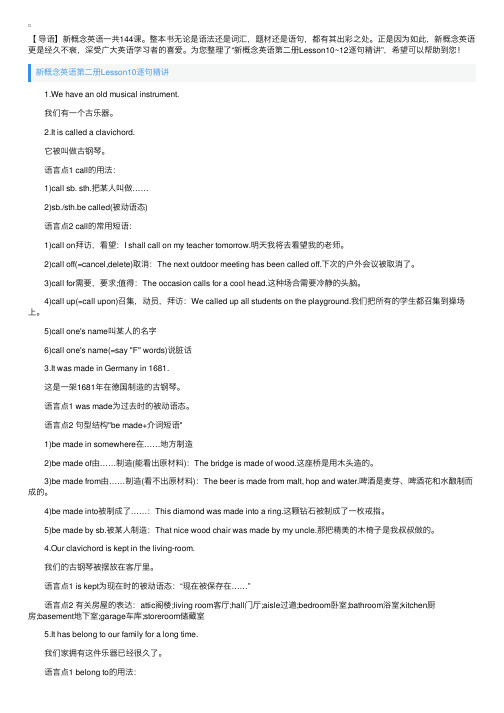
【导语】新概念英语⼀共144课。
整本书⽆论是语法还是词汇,题材还是语句,都有其出彩之处。
正是因为如此,新概念英语更是经久不衰,深受⼴⼤英语学习者的喜爱。
为您整理了“新概念英语第⼆册Lesson10~12逐句精讲”,希望可以帮助到您!新概念英语第⼆册Lesson10逐句精讲 1.We have an old musical instrument. 我们有⼀个古乐器。
2.It is called a clavichord. 它被叫做古钢琴。
语⾔点1 call的⽤法: 1)call sb. sth.把某⼈叫做…… 2)sb./sth.be called(被动语态) 语⾔点2 call的常⽤短语: 1)call on拜访,看望:I shall call on my teacher tomorrow.明天我将去看望我的⽼师。
2)call off(=cancel,delete)取消:The next outdoor meeting has been called off.下次的户外会议被取消了。
3)call for需要,要求;值得:The occasion calls for a cool head.这种场合需要冷静的头脑。
4)call up(=call upon)召集,动员,拜访:We called up all students on the playground.我们把所有的学⽣都召集到操场上。
5)call one's name叫某⼈的名字 6)call one's name(=say "F" words)说脏话 3.It was made in Germany in 1681. 这是⼀架1681年在德国制造的古钢琴。
语⾔点1 was made为过去时的被动语态。
语⾔点2 句型结构"be made+介词短语" 1)be made in somewhere在……地⽅制造 2)be made of由……制造(能看出原材料):The bridge is made of wood.这座桥是⽤⽊头造的。
新概念英语第二册第2课课文详解及语法解析
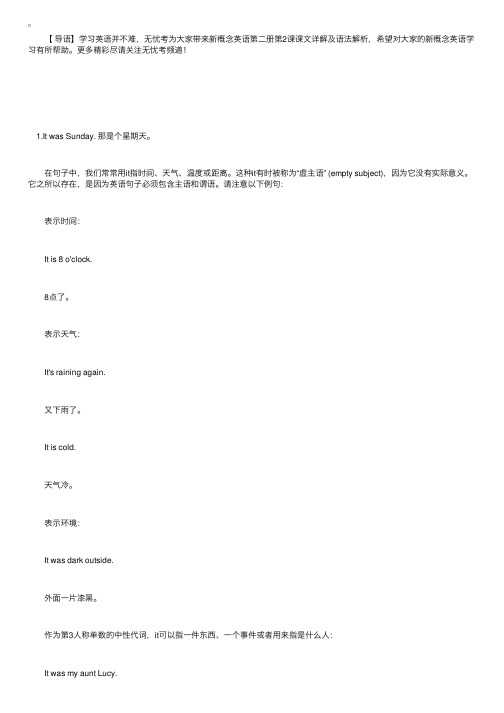
【导语】学习英语并不难,⽆忧考为⼤家带来新概念英语第⼆册第2课课⽂详解及语法解析,希望对⼤家的新概念英语学习有所帮助。
更多精彩尽请关注⽆忧考频道! 1.It was Sunday. 那是个星期天。
在句⼦中,我们常常⽤it指时间、天⽓、温度或距离。
这种it有时被称为“虚主语” (empty subject),因为它没有实际意义。
它之所以存在,是因为英语句⼦必须包含主语和谓语。
请注意以下例句: 表⽰时间: It is 8 o'clock. 8点了。
表⽰天⽓: It's raining again. ⼜下⾬了。
It is cold. 天⽓冷。
表⽰环境: It was dark outside. 外⾯⼀⽚漆⿊。
作为第3⼈称单数的中性代词,it可以指⼀件东西、⼀个事件或者⽤来指是什么⼈: It was my aunt Lucy. 是我姑母露西。
(打来电话者) It is a lovely baby. 真是个可爱的⼩宝宝。
2.on Sundays 在星期天的时侯 (1)复数形式指每个星期⽇,或⼤部分星期⽇,与⼀般现在时连⽤,表⽰经常性的⾏为: We do not go to school on Sundays. 星期天我们不上学。
I never get up early on Sundays. 星期天我从来不早起。
(2)介词on⼀般⽤于表⽰某⼀天的时间短语中: on Monday 星期⼀ on Friday 星期五 on Monday morning 在星期⼀早上 on that day 在那⼀天 当我们使⽤last, next和this, that时,介词(以及定冠词)必须省略: I'll see you next/this Friday. 下个/这个星期五再见。
Last Sunday I got up very late. 上个星期天我起得很晚。
3.I sometimes stay in bed until lunchtime. 有时我要⼀直躺到吃午饭的时候。
最新新概念英语第二册Lesson94~96逐句精讲

新概念英语第二册Lesson94逐句精讲1、Experiments have proved that children can be instructed in swimming at a very early age.实验证明,儿童在很小的时候就可以开始学习游泳了。
语言点 can be instructed in doing可以接受……训练2、At a special swimming pool in Los Angeles, children become expert at holding their breath under water even before they can walk.在洛杉矶的一个特别设计的游泳池里,孩子们甚至在还不会走路时就已经能熟练地在水下屏住呼吸了。
语言点 sb. become expert at doing sth.某人能够熟练地做某事3、Babies of two months old do not appear to be reluctant to enter the water. It is not long before they are so accustomed to swimming that they can pick up weights from the floor of the pool.两个月大的婴儿并没有表现出来他们不愿意下水。
他们很快就适应了游泳,并能从池底检东西呢。
语言点1 babies of two months两个月大的婴儿语言点2 sb. be accustomed to doing sth.某人适应做某事4、A game that is very popular with these young swimmers is the underwater tricycle race.这些幼小的游泳运动员非常喜爱的一种游戏是水下三轮车比赛。
新概念英语第二册逐句精讲Lesson82~84

【导语】新概念英语作为家喻户晓的经典之作,它有着全新的教学理念,有趣的课⽂内容及其全⾯的技能训练,为⼴⼤的英语学习者提供帮助!如果你也想学好英语,⼜怎能错过新概念英语?下⾯为您提供了相关内容,希望对您有所帮助!新概念英语第⼆册逐句精讲Lesson82 1、Fishermen and sailors sometimes claim to have seen monsters in the sea. ⼀些渔民和船员有时声称他们在海⾥看到过妖怪。
语⾔点 claim to have seen⽤完成时的形式表⽰不定式的过去时,强调声称的结果。
2、Though people have often laughed at stories told by seamen, it is now known that many of these monsters,which have at times been sighted are simply strange fish. 尽管⼈们常常对他们讲的故事付诸⼀笑,但是现在看来,⼈们有时看到的这些"妖怪" 很多不过是⼀些奇怪的鱼。
语⾔点 it is now known是⼀般现在时的被动语态,表系"被知道" ;have been sighted现在完成时的被动语态。
3、Occasionally, unusual creatures are washed to the shore, but they are rarely caught out at sea. ⼀些罕见的⽣物偶尔会被冲上海滩,但是它们在海⾥却很少被捕到。
语⾔点 sth. be washed to somewhere某物被冲到某地 4、Some time ago, however, a peculiar fish was caught near Madagascar. 然⽽不久前,在马达加斯加附近却捕获了⼀条奇怪的鱼。
新概念英语第二册笔记(精美打印版)
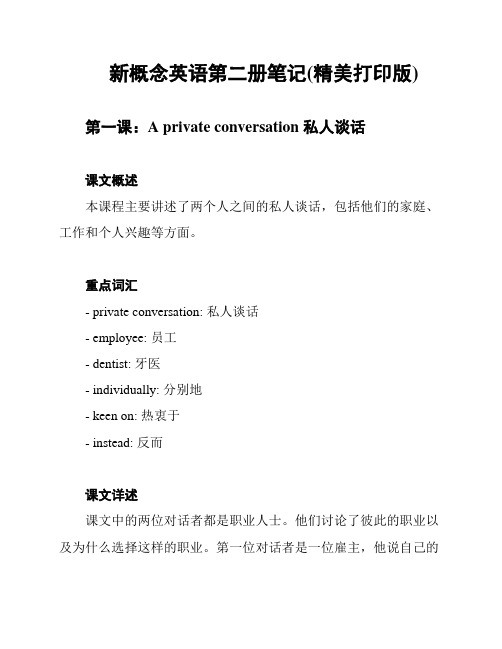
新概念英语第二册笔记(精美打印版)第一课:A private conversation 私人谈话课文概述本课程主要讲述了两个人之间的私人谈话,包括他们的家庭、工作和个人兴趣等方面。
重点词汇- private conversation: 私人谈话- employee: 员工- dentist: 牙医- individually: 分别地- keen on: 热衷于- instead: 反而课文详述课文中的两位对话者都是职业人士。
他们讨论了彼此的职业以及为什么选择这样的职业。
第一位对话者是一位雇主,他说自己的员工做事不利索,需要手把手地指导。
他所雇佣的人中,有一位牙医,这位牙医个人能力很强,但做事不守规矩。
第二位对话者是一位操控电视卫星的技术员,他对自己的工作很满意。
他认为这份工作能提供稳定的收入,而且他对这个技术很感兴趣。
相比之下,他并不喜欢在办公室工作。
他坚信个人的兴趣和爱好应该引导自己的职业选择,而不仅仅是为了赚钱。
在谈论个人爱好时,两位对话者发现他们都对音乐很感兴趣。
然而,他们的爱好有所不同。
第一位对话者表示,他喜欢个别的音乐会,而不是大型音乐会。
第二位对话者则喜欢大型音乐会,认为那种氛围和观众的热情是独一无二的。
课后练1. 为什么第一位对话者对自己的员工感到不满意?2. 第二位对话者为什么喜欢做电视卫星的技术员?3. 两位对话者的音乐兴趣有何不同?参考答案1. 第一位对话者对自己员工感到不满意是因为他们做事情不利索,需要手把手地指导。
2. 第二位对话者喜欢做电视卫星的技术员是因为这份工作能提供稳定的收入,而且他对这个技术很感兴趣。
3. 两位对话者的音乐兴趣不同。
第一位对话者喜欢个别的音乐会,而第二位对话者喜欢大型音乐会。
新概念英语第二册Lesson88~90逐句精讲

【导语】学习新概念英语并不难啊。
你还在为英语成绩低拖后腿⽽烦恼吗?不要着急,⼩编为⼤家提供了“新概念英语第⼆册Lesson88~90逐句精讲”。
相信加⼊学习当中的你,很快便不再受英语的困扰!还在等什么?和⼩编⼀起来学习吧!新概念英语第⼆册Lesson88逐句精讲 1、Six men have been trapped in a mine for seventeen hours. 6个⼈被困在矿井中已有16个⼩时了。
语⾔点 sb. be trapped in somewhere某⼈被困在某地 2、If they are not brought to the surface soon they may lose their lives. 如果不把他们尽快救出来,他们就有可能丧⽣。
语⾔点 if引导真实条件句。
3、However, rescue operations are proving difficult. 然⽽,事实证明救援⼯作⾮常困难。
语⾔点 sth. be proving difficult证明某事进展困难 sth. be proving smooth证明某事进展顺利 4、If explosives are used,vibrations will cause the roof of the mine to collapse. 如果使⽤炸药爆破,震动将会引起矿顶塌落。
语⾔点在此if引导真实条件句。
5、Rescue workers are therefore drilling a hole on the north side of the mine. 因此,救援⼈15在矿井的北⾯钻了⼀个洞。
6、They intend to bring the men up in a special capsule. 他们想⽤⼀种特制的容器把困在下⾯的⼈带上来。
语⾔点 sb. intend to do sth.某⼈打算做某事 7、If there had not been a hard layer of rock beneath the soil, they would have completed the job in few hours. 如果不是⼟壤下⾯有⼀层坚硬的岩⽯,他们的营救⼯作仅⽤⼏个⼩时就可以完成了。
新概念英语第2册逐句精讲Lesson31~33

【导语】新概念英语作为家喻户晓的经典之作,它有着全新的教学理念,有趣的课⽂内容及其全⾯的技能训练,为⼴⼤的英语学习者提供帮助!如果你也想学好英语,⼜怎能错过新概念英语?下⾯⽆忧考为您提供了相关内容,希望对您有所帮助!新概念英语第2册逐句精讲Lesson31 1、Yesterday afternoon Frank Hawkins was telling me about his experiences as a young man. 昨天下午,弗兰克•霍⾦斯向我讲述了他年轻时的经历。
语⾔点 tell sb. about / of one’s experiences / story 向……讲述某⼈的经历: Tom told me of his unforgettable experiences in U.S.A. 汤姆向我讲述了他在美国的⼀些让⼈难忘的经历。
2、Before he retired,Frank was the head of a very large business company, but as a boy he used to work in a small shop. 在退休前,弗兰克是⼀个⾮常⼤的商业公司的经理。
但在他⼩时候,他曾在⼀个⼩铺⾥做⼯。
语⾔点1 本句中before引导时间状语从句,but连接并列句。
语⾔点2 关于“领导,领袖”的词汇: head / leader 领袖 headmaster 中⼩学校长 principal⾸长;中⼩学校长 director主任,主管,董事;导演 superior 上级,上司 CEO: Chief Executive Officer ⾸席执⾏官 CFO: Chief Financial Officer ⾸席财务官 COO: Chief Operating Officer ⾸席运营官 CIO: Chief Information Officer ⾸席信息官 CTO: Chief Technology Officer ⾸席技术官 语⾔点3 used to do sth.过去常常做某事(现在已经不做了): I used to go to school by bicycle.过去我经常骑⾃⾏车上学。
新概念英语第二册 第2课Breakfast or lunch
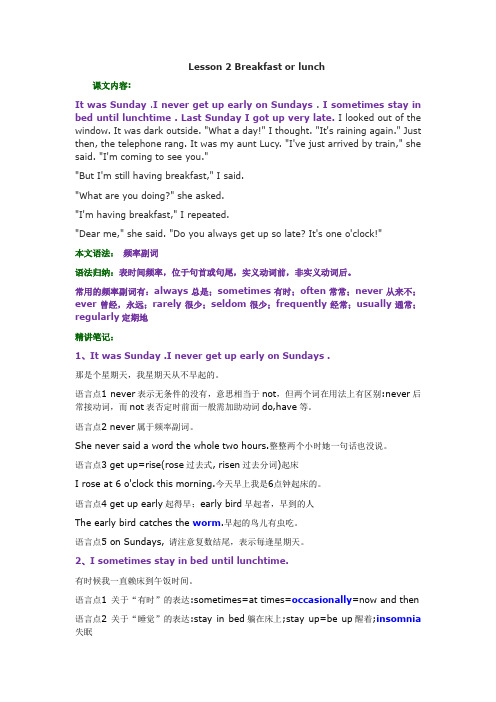
Lesson 2 Breakfast or lunch课文内容:It was Sunday.I never get up early on Sundays. I sometimes stay in bed until lunchtime. Last Sunday I got up very late.I looked out of the window. It was dark outside. "What a day!" I thought. "It's raining again." Just then, the telephone rang. It was my aunt Lucy. "I've just arrived by train," she said. "I'm coming to see you.""But I'm still having breakfast," I said."What are you doing?" she asked."I'm having breakfast," I repeated."Dear me," she said. "Do you always get up so late? It's one o'clock!"本文语法:频率副词语法归纳:表时间频率,位于句首或句尾,实义动词前,非实义动词后。
常用的频率副词有:always总是;sometimes有时;often常常;never从来不;ever曾经,永远;rarely很少;seldom很少;frequently经常;usually通常;regularly定期地精讲笔记:1、It was Sunday .I never get up early on Sundays .那是个星期天,我星期天从不早起的。
新概念英语第2册Lesson52~54逐句精讲
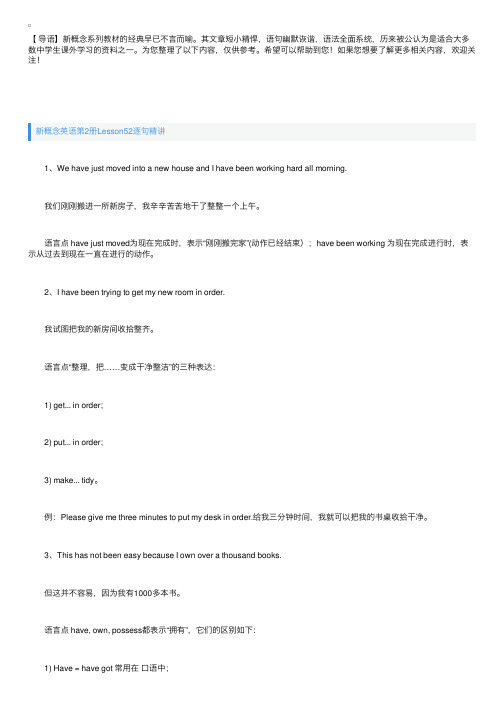
【导语】新概念系列教材的经典早已不⾔⽽喻。
其⽂章短⼩精悍,语句幽默诙谐,语法全⾯系统,历来被公认为是适合⼤多数中学⽣课外学习的资料之⼀。
为您整理了以下内容,仅供参考。
希望可以帮助到您!如果您想要了解更多相关内容,欢迎关注!新概念英语第2册Lesson52逐句精讲 1、We have just moved into a new house and I have been working hard all morning. 我们刚刚搬进⼀所新房⼦,我⾟⾟苦苦地⼲了整整⼀个上午。
语⾔点 have just moved为现在完成时,表⽰“刚刚搬完家”(动作已经结束);have been working 为现在完成进⾏时,表⽰从过去到现在⼀直在进⾏的动作。
2、I have been trying to get my new room in order. 我试图把我的新房间收拾整齐。
语⾔点“整理,把……变成⼲净整洁”的三种表达: 1) get... in order; 2) put... in order; 3) make... tidy。
例:Please give me three minutes to put my desk in order.给我三分钟时间,我就可以把我的书桌收拾⼲净。
3、This has not been easy because I own over a thousand books. 但这并不容易,因为我有1000多本书。
语⾔点 have, own, possess都表⽰“拥有”,它们的区别如下: 1) Have = have got 常⽤在⼝语中; 2) own强调合法地拥有某物; 3) possess更突出从属关系。
4、To make matters worse, the room is rather small, so I have temporarily put my books on the floor. 更糟糕的是房间还⾮常⼩,所以我暂时把书放在了地板上。
新概念英语第2册Lesson34~36逐句精讲
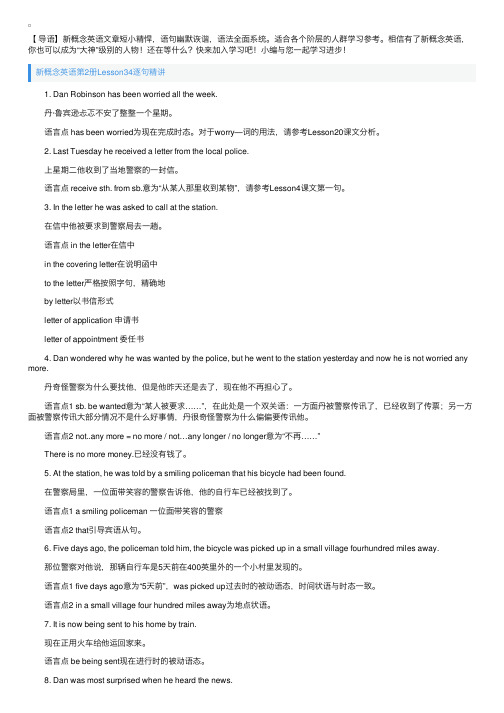
【导语】新概念英语⽂章短⼩精悍,语句幽默诙谐,语法全⾯系统。
适合各个阶层的⼈群学习参考。
相信有了新概念英语,你也可以成为“⼤神”级别的⼈物!还在等什么?快来加⼊学习吧!⼩编与您⼀起学习进步!新概念英语第2册Lesson34逐句精讲 1. Dan Robinson has been worried all the week. 丹·鲁宾逊忐忑不安了整整⼀个星期。
语⾔点 has been worried为现在完成时态。
对于worry—词的⽤法,请参考Lesson20课⽂分析。
2. Last Tuesday he received a letter from the local police. 上星期⼆他收到了当地警察的⼀封信。
语⾔点 receive sth. from sb.意为“从某⼈那⾥收到某物”,请参考Lesson4课⽂第⼀句。
3. In the letter he was asked to call at the station. 在信中他被要求到警察局去⼀趟。
语⾔点 in the letter在信中 in the covering letter在说明函中 to the letter严格按照字句,精确地 by letter以书信形式 letter of application 申请书 letter of appointment 委任书 4. Dan wondered why he was wanted by the police, but he went to the station yesterday and now he is not worried any more. 丹奇怪警察为什么要找他,但是他昨天还是去了,现在他不再担⼼了。
语⾔点1 sb. be wanted意为“某⼈被要求……”,在此处是⼀个双关语:⼀⽅⾯丹被警察传讯了,已经收到了传票;另⼀⽅⾯被警察传讯⼤部分情况不是什么好事情,丹很奇怪警察为什么偏偏要传讯他。
最新新概念英语第二册第二课经典语法讲解

Noble English诺博英语语法经典讲解Lesson Two Breakfast or Lunch1. It was Sunday. It was my aunt Lucy.在句子中,我们常用it指代时间、天气、温度或距离。
因为它没有实际意义,所以有时被称为“虚主语”;它之所以存在,是因为英语句子必须包含主语和谓语。
请看下面句子中的it分别代表什么:a. It’s 8 o’clock.b. It’s raining again.c. It is cold. d. It was dark outside.作为第三人称的中性词,it 可以指一件东西、一个事件或者用来指是什么人:a. It is a lovely baby. 真是个可爱的小宝宝。
b. ---Who is it? 谁?---It’s me, Zang Jinming. 是我,臧金铭。
2. I never get up early on Sundays.注意,没有说明是具体哪一天,泛指的morning, afternoon ,evening 前面的介词用in ,而涉及到具体的某一天,其介词要用on。
During the winter holidays, Wang Jiawen usually did her homework in the morning and surfed the Internet in the afternoon.课文中,sunday后面加上s, 表示每个星期天,或大部分星期天,与一般现在时连用,表示经常性的行为。
例如:I learn English on Sundays.I learn English on Sunday mornings.但是,当我们使用last, next, this 和that时,那些介词(以及定冠词)就要省去:Last Sunday I got up very late. 上个星期天我起得很晚。
新概念英语第二册逐句精讲Lesson1~3

【导语】新概念英语之所以经久不衰是因为以其全新的教学理念,有趣的课⽂内容和全⾯的技能训练,为英语学习者排忧解难,深受⼴⼤英语学习者的欢迎和喜爱。
想要学好英语的你,怎能错过?快来加⼊学习吧!⽆忧考为您提供了以下内容,希望能够为⼤家学习新概念英语提供帮助!新概念英语第⼆册逐句精讲Lesson1 st week I went to the theatre.上星期我去看戏。
语⾔点1 时间状语开门见⼭,点明时态为过去时,因⽽谓语动词go to使⽤过去式went to。
语⾔点2 在theatre,cinema,picture等名词前⼀定要加定冠词the。
如:go to the theatre/play去看戏;go to thecinema/movies去看电影(英/美);go to the pictures/films去看电影;be at the theatre/cinema在戏院看戏/在电*看电影。
2.I had a very good seat.我的座位很好。
语⾔点1 had为have的过去式,延续last week所要求的时态。
语⾔点2 a very good seat=a very good place指视线⽆遮挡,所处位置⾮常好,⽽⾮椅⼦本⾝材料好。
3.The play was very interesting.那场戏⾮常有意思。
语⾔点 very是副词,interesting是形容词,副词修饰形容词⼀般放在形容词前。
good enough是特例。
4. I did not enjoy it. 我却⽆法欣赏。
语⾔点1 did not常⽤于正式写作中,其缩写didn't常在⼝语中使⽤,类似有:cannot/can not=can't,could not=couldn't,do not=don't,will not=won't,shall not=shan't,have not=haven't等。
新概念英语第二册Lesson4~6逐句精讲
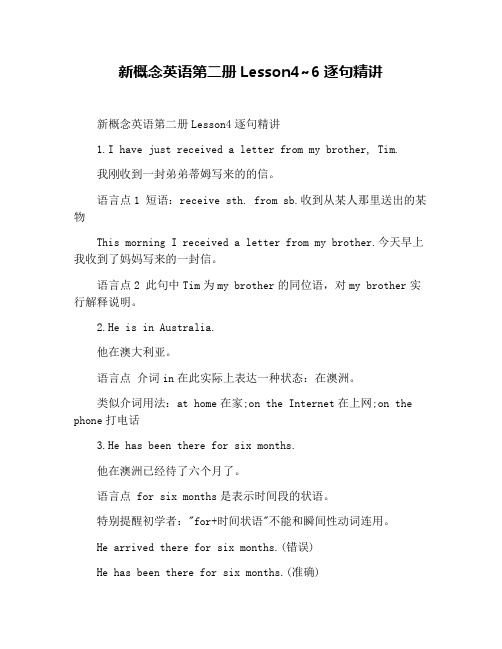
新概念英语第二册Lesson4~6逐句精讲新概念英语第二册Lesson4逐句精讲1.I have just received a letter from my brother, Tim.我刚收到一封弟弟蒂姆写来的的信。
语言点1 短语:receive sth. from sb.收到从某人那里送出的某物This morning I received a letter from my brother.今天早上我收到了妈妈写来的一封信。
语言点2 此句中Tim为my brother的同位语,对my brother实行解释说明。
2.He is in Australia.他在澳大利亚。
语言点介词in在此实际上表达一种状态:在澳洲。
类似介词用法:at home在家;on the Internet在上网;on the phone打电话3.He has been there for six months.他在澳洲已经待了六个月了。
语言点 for six months是表示时间段的状语。
特别提醒初学者:"for+时间状语"不能和瞬间性动词连用。
He arrived there for six months.(错误)He has been there for six months.(准确)原因:瞬间动词的动词不能够延续,而be there表示状态,能够延续。
So far, I have lived in Beijing for eight years.到现在,我已经在北京住了8年了。
4.Tim is an engineer.蒂姆是一名工程师。
语言点 engineer: one who operates an engine工程师,即操作或修理发动机的人1)engine(发动机)+er(表人)——engineer2)fire engine消防车3)engineer(=design/devise)设计:The villa is very well engineered.这套别墅设计得很好。
新概念英语第二册Lesson61~63逐句精讲
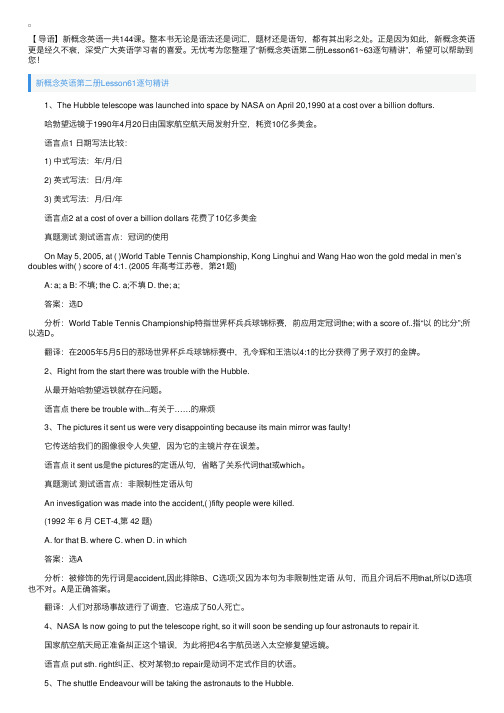
【导语】新概念英语⼀共144课。
整本书⽆论是语法还是词汇,题材还是语句,都有其出彩之处。
正是因为如此,新概念英语更是经久不衰,深受⼴⼤英语学习者的喜爱。
⽆忧考为您整理了“新概念英语第⼆册Lesson61~63逐句精讲”,希望可以帮助到您!新概念英语第⼆册Lesson61逐句精讲 1、The Hubble telescope was launched into space by NASA on April 20,1990 at a cost over a billion dofturs. 哈勃望远镜于1990年4⽉20⽇由国家航空航天局发射升空,耗资10亿多美⾦。
语⾔点1 ⽇期写法⽐较: 1) 中式写法:年/⽉/⽇ 2) 英式写法:⽇/⽉/年 3) 美式写法:⽉/⽇/年 语⾔点2 at a cost of over a billion dollars 花费了10亿多美⾦ 真题测试测试语⾔点:冠词的使⽤ On May 5, 2005, at ( )World Table Tennis Championship, Kong Linghui and Wang Hao won the gold medal in men’s doubles with( ) score of 4:1. (2005 年髙考江苏卷,第21题) A: a; a B: 不填; the C. a;不填 D. the; a; 答案:选D 分析:World Table Tennis Championship特指世界杯兵兵球锦标赛,前应⽤定冠词the; with a score of..指“以的⽐分”;所以选D。
翻译:在2005年5⽉5⽇的那场世界杯乒乓球锦标赛中,孔令辉和王浩以4:1的⽐分获得了男⼦双打的⾦牌。
2、Right from the start there was trouble with the Hubble. 从最开始哈勃望远铁就存在问题。
精讲新概念英语第二册(第2课)

注意和另一个时间介词by的区别
• “by+时间点”也可以表示“到。。。以前 为止”, 如果by后加表示将来的时间,应 用一般将来时;如果by后加表示过去的时 间,则用过去完成时
• By the end of next month, I will finish reading this book.
注意区分“直到……才”(not until)和“直到……为止”(until) 的方法
• 把until作为时间终止线。 • 从句的时间终点之前,这个动作做了
还是没做? 做了——肯定;没做——否定。
实战演练
• He ______ until it stopped raining. • A. waited B. didn't wait • A. leave B. left C. didn't leave
中考链接
• (2010盐城)Many students didn’t realize the importance of study ________ they left school.
• A. when B. until C. as D. after
考点:not until 放在句首时 一般要用到装语序
• By the end of last year we had built two new houses.
词汇强化练习: until / by
• 《新概念英语同步教材 词汇练习》P4~1
☆ring (rang, rung) v.(铃、电话等)响
• [注]这种响是刺耳的,往往是提醒人做 某事 如:The telephone/door bell is ringing.
• (come是终止性动词,所以用否定式)
新概念英语第二册逐句精讲

新概念英语第二册逐句精讲Alright, let's dive straight into the detailed explanations of New Concept English Book 2, focusing on making each paragraph unique and conversational in tone.First up, this sentence: "He always talks big, but his work never matches his words." Simple yet effective, it conveys the message that someone's bragging doesn't always match their performance. Like, you know that guy who always promises to do big things but never delivers? Yeah, that's the kind of person this sentence describes.Moving on, here's a more descriptive one: "The sunset cast a beautiful orange hue over the sky, painting the clouds with a warm glow." This one captures the beauty of nature, specifically the sunset, in a vivid way. It'salmost like you can see the sky turning orange and the clouds getting a soft, warm touch.Now, let's talk about emotions. This sentence hits home:"I can't believe he broke our promise like that. It feels like he doesn't care about our friendship at all." This expresses disappointment and hurt feelings over someone breaking a promise, highlighting the importance of trust and friendship.For a more philosophical note, we have: "Life is like a journey, full of unexpected turns and challenges. But it's up to us to navigate through it and make the most of it." This sentence encourages people to take control of their lives and see it as an adventure, rather than something to be feared.Lastly.。
- 1、下载文档前请自行甄别文档内容的完整性,平台不提供额外的编辑、内容补充、找答案等附加服务。
- 2、"仅部分预览"的文档,不可在线预览部分如存在完整性等问题,可反馈申请退款(可完整预览的文档不适用该条件!)。
- 3、如文档侵犯您的权益,请联系客服反馈,我们会尽快为您处理(人工客服工作时间:9:00-18:30)。
新概念英语第二册逐句精讲语言点第2课 (4)
Lesson 2 Breakfast or lunch
课文内容:
It was Sunday. I never get up early on Sundays. I sometimes stay in bed until lunchtime. Last Sunday I got up very late.
I looked out of the window. It was dark outside. ‘What a
day!’ I thought. "It's raining again." Just then, the telephone rang. It was my aunt Lucy."I've just arrived by train," she said. "I'm coming to see you. "
"But I'm still having breakfast," I said.
"What are you doing?" she asked.
"I'm having breakfast," I repeated.
"Dear me," she said. "Do you always get up so late? It's one o'clock!"
精讲笔记:
10."I've just arrived by train," she said. "I'm coming to see you."
“我刚下火车,”她说,“我就要来看你了。
”
语言点1 “by+交通工具”表示“乘坐……”:by air/by airplane 乘飞机;by boat/ship乘船;by bike骑自行车;by bus乘公交车;by car乘小汽车;by train乘火车
但表达“步行”时,不可说by foot, 应为on foot.
语言点2 瞬间性动词用于实行时态时表示即将开始的动作。
这些词主要有:come来;leave离开;arrive到达;land着陆;meet见到;die死;start开始;retur返回;join加入
He is leaving。
他就要准备走了。
We are starting。
我们准备开始了。
Most young people will be meeting the pop singers at the airport。
绝大部分年轻人即将在机场迎接这些流行歌手。
11."But I'm still having breakfast," I said.
“但是我还在吃早餐呢,”我回答道。
语言点 still意为“仍然,还在”,在句子中起强调作用。
Today the best jobs are still given to men.现在的工作还是给了男人。
He came yesterday and he is still here.他昨天来的,现在仍在这里。
12."What are you doing?"she asked.
“你在干吗呢?”她问道。
语言点 doing表示正在做某事,前句用having,此句用doing,问答一致。
此句意思可随语调改变,声调表示疑问,降调则转变为责怪。
